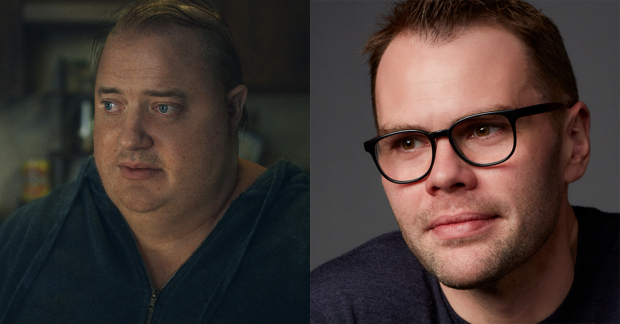Brendan Fraser and Samuel D Hunter discuss the theatrical roots of ”The Whale”

© A24/Gregory Costanzo
Darren Aronovsky’s new film adaptation, hitting UK cinemas on 3 February, has gotten the same kind of reception since its festival premieres began last autumn. Hunter adapted his play for the big screen, with Brendan Fraser delivering a once-in-a-lifetime performance as Charlie, alongside similarly stunning turns from co-stars Sadie Sink and Hong Chau.
Prior to the film’s US release, we sat down with Fraser and Hunter to discuss the new movie and its theatrical roots.
(This conversation has been condensed and edited for clarity.)
Brendan, did you see the play before this process started?
Brendan Fraser: I did not see the play. I was so moved by Sam’s screenplay. It’s the story of a man who had been living alone for a long amount of time, with considerable regrets for some life choices he made, that life chose him to make. I knew he had been sadly harming himself by overeating and that his health was severely compromised. He had very little time, and his only hope to redeem himself in the eyes of his daughter was to reconnect with her and let her know, if she’ll let him, how much he loves her and that he knows he made a mistake, and that he believes in the great person she will become.
Was it an instant yes for you after reading it?
Fraser: When the word went out that Darren [Aronovsky] was gonna make the film and he was interested in sitting down with me…Any actor worth his weight would want to sit down with him, given his proven track record of bringing out performances from the actors he hires that reinvent who they are to us as audiences, from [Mickey Rourke in] The Wrestler to [Natalie Portman in] Black Swan, all the way back to Requiem for a Dream and Pi. The answer was yes. I did want to sit down with him. I had the opportunity, and he was a gentleman.
He was very specific that he didn’t know if he could make the movie. It had to do with the circumstances of casting the role and creating Charlie from the outside in, because it was Sam’s job to create the character from the inside out. I had a little bit of creative intimidation to work with Darren at first, which quickly dispersed, given how collaborative he is and how interested he is in bringing people who are very good at what they do together.
Darren staged a reading in the East Village, with myself and Sadie Sink, along with three or four other actors who he asked to read the other parts. That’s where I met Sam for the first time, and I was hopeful that we were truthful to what he had written.
Samuel D Hunter: And you were.
Fraser: Well, thank you. And for my ear, it sounded really great aloud. It was moving to read this play aloud.
Sam, having seen this play come to life around the country and the world in so many different ways, what is it like to now experience it on screen?
Hunter: It’s been overwhelming. It’s a very rare experience for a playwright to get to adapt their own play, in a way that’s pretty faithful to the original text, with some cinematic language in there. But also, this group of people came together in the middle of a pandemic to tell this story, and I’m never gonna forget it. I was on set the entire time. It felt like we were taking care of each other.
And to your point, I’ve seen so many people do this play over the years. Great actors. There’s something about plays. They’re ephemeral. You see them, they happen in front of you, and then they dissipate in a beautiful way. It’s one of the things I love about theatre. But there’s a permanence to film. That was anxiety-provoking for me. I was like, “Once this thing exists, it’s never gonna go away, and it’s never gonna change.” It’s not like a play, which is almost like a living document.
What does Brendan bring to the role?
Hunter: From the first moment seeing Brendan do this role…He inhabits this guy in ways that I just never thought possible. It’s an act of beauty what Brendan has done with this role.
Fraser: Sam, something occurs to me now that we three are talking about this. With the number of productions that have been done in the years preceding our film, I can’t help but think we owe a debt of gratitude to all of those productions, because they’re bricks in the road that led us to the place where we could memorialize it in front of a camera.
Hunter: That’s exactly right. Credit due to the Denver Center for being the first theatre in the country to be like, “Hey, maybe we could actually produce this thing.” And to Tim Sanford at Playwrights Horizons, who thought it belonged in New York City. Even before them. I developed it at Play Penn in Philadelphia, I developed it in Denver, I developed it at the Lark in New York City. It’s a huge theatre community that came together to make this story, and, to your point, Brendan, we do owe them a huge thank you.
What do you hope the audience’s takeaway is?
Fraser: This is the kind of story that gets you in the feels, and if it doesn’t, you’re a rock.














